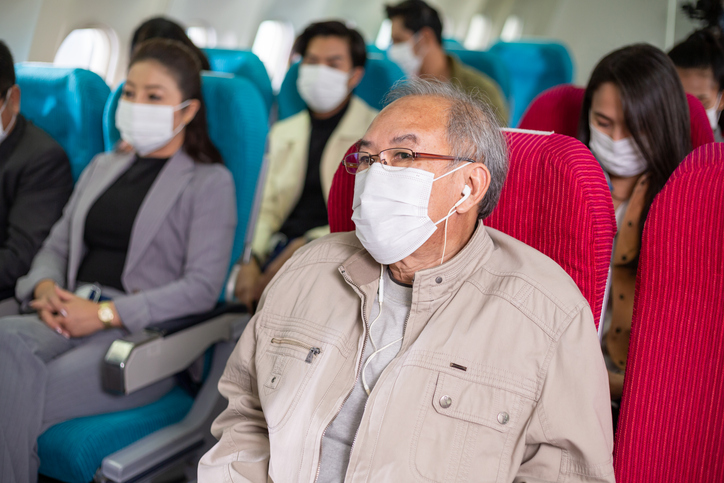Federal mandates to wear a face mask on airplanes, buses, and trains are scheduled to end in September, but the reported emergence of the new SARS-CoV-2 Delta variant may spur the Biden administration to extend the requirement.
President Joe Biden issued the mandates in an executive order the day after his inauguration. They are enforced by the Federal Aviation Administration (FAA), Centers for Disease Control and Prevention (CDC), the Transportation Security Administration (TSA), and “other executive departments and agencies that have regulatory authority.”
The TSA implemented its mask mandate on February 2 and set an expiration date of May 11 before extending the mandate in April, citing CDC guidelines.
During the Trump administration, most airlines required passengers to wear masks, but there was no government mandate.
Call to End Mandates
A bipartisan group of U.S. senators in June urged the Biden administration to end the mandates.
“This is something we need to continue to revisit,” Roll Call quoted Transportation Secretary Pete Buttigieg as saying on June 17. “And while I haven’t seen … a specific rubric that says ‘if we hit this benchmark, we can say goodbye to the masks, which we’re all eager to do,’ I do think it’s of course true that the sooner we get as many people as possible vaccinated, the sooner we can get there.”
The following month, the CDC updated its guidance to recommend indoor masking even for vaccinated individuals, a step back instead of a return to normal.
CDC Control
“TSA mask mandates will undoubtedly be updated to reflect CDC recommendations,” said Joel M. Zinberg, a senior fellow at the Competitive Enterprise Institute. “The Delta variant surge will likely subside over the next few weeks, weakening the rationale for current CDC mask guidelines.”
United Airlines CEO Scott Kirby told CBS’ Face the Nation on July 11 he expects the September expiration date to stick, “but we’ll wait and see for sure.”
Kirby said leisure travel has recovered more than 100 percent but business travel continues to suffer.
Protection Tradeoff
Forced masking on transportation has drawbacks beyond the loss of comfort and individual choice. For some airline and airport employees, mandates have made their jobs more difficult and even dangerous.
Flight attendants have become de facto enforcers of in-flight mask mandates. This has led to tension, stress, and fights, sometimes physical, with disobedient passengers.
The FAA has received more than 2,400 reports of unruly passenger behavior on airplanes related to refusal to wear face masks so far this year. The FAA has fined individuals as much as $21,500 for refusing to wear a mask.
Anecdotes or Statistics
Reports of non-compliance are difficult to evaluate, often depending on whether there are passenger complaints, says Bob Frantz, communications director at Citizens for Free Speech.
“We have heard from many of our members’ first-hand accounts of passengers being scolded and threatened with deplaning for taking their masks down to eat snacks or take drinks, or failing to keep their young children masked for the duration of the flight,” Frantz said.
Rights Denied
Mask mandates are an attack on First Amendment rights, Frantz says.
“Mask mandates literally rob people of their rights to free speech and expression, as their speech is muffled by face coverings, leading people to have to pull their masks down in many instances in order to be heard,” Frantz said.
Air traffic controllers and pilots have also been burdened by the strict mask mandates. In March, investigative journalist Alex Berenson reported an anonymous air traffic controller warned the FAA’s stringent mask requirements could lead to disaster. The FAA requires air traffic controllers to wear a mask over the nose and mouth when communicating with pilots remotely. According to Berenson’s source, this has led to pilots misunderstanding time-sensitive safety instructions.
“Worst case scenario, … it results in disaster if we can’t correct them before we lose them on [radio],” the source wrote in an email to Berenson.
Mask Orders Forever?
Although lockdowns and mask mandates were softened or revoked in states across the country, the emergence of the Delta variant has led to a renewal of government orders to wear masks.
In July, CDC Director Rochelle Walensky recommended municipalities with increasing coronavirus case numbers and low vaccination rates impose mask mandates. Nevada, undergoing a surge of cases reportedly related to the Delta variant, imposed an indoor mask mandate hours after the CDC released its guidance. By the end of the month, Washington, D.C. imposed a new citywide mandate.
Several counties in the San Francisco Bay Area (encompassing the cities of San Francisco, Oakland, and San Jose) and Louisiana imposed a new mandate at the beginning of August. Los Angeles put a mask order into effect on July 17, but Los Angeles Sheriff Alex Villanueva said his department would not enforce it.
Low Death Count
The mandates arrived at a time when the weekly death count was roughly the lowest it has been during the pandemic.
Five Republican governors responded to the guidance by publicly opposing it or banning mask mandates in their states. Some Democrats are choosing more moderate measures. New York City Mayor Bill de Blasio and Michigan Gov. Gretchen Whitmer declined to impose stricter mask orders.
Texas Democrats who fled to Washington D.C. on private planes to boycott voter integrity legislation were pictured without masks, and masks were not widely visible at President Barack Obama’s birthday bash at his house on Martha’s Vineyard.
Harry Painter (harry@harrypainter.com), (@TheHarryPainter) writes from Tulsa, Oklahoma.
This article was updated 6pm ET, August 12, 2021.
